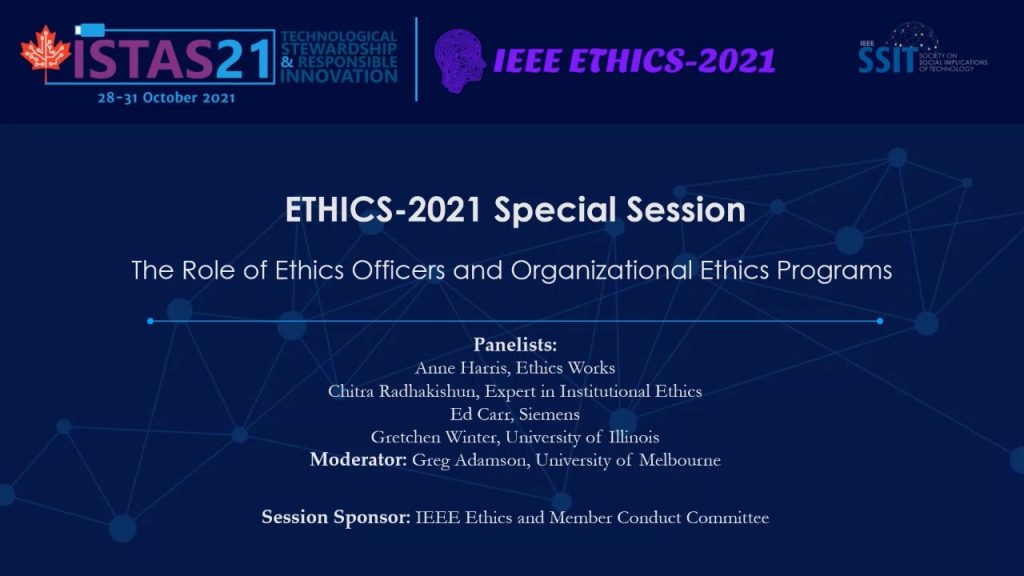
The Role of Ethics Officers and Organizational Ethics Programs panel, took place on 30 October 2021 within Ethics 2021. Featuring four current or former Ethics Officers of international corporations or organizations, this panel will focus on the strengths and areas for improvement of organizational ethics programs. Panelists included: Edward Carr, Siemens; Anne Harris, Ethics Works; Chitra Barth-Radhakishun, Expert in Institutional Ethics and Gretchen A. Winter, University of Illinois.
Click here to watch the video of the panel discussion.
Moderator, Greg Adamson (University of Melbourne), opened the session by introducing each member of the panel and requested each panelist to provide some insight on their role as an Ethics Officer at each of their respective companies.
Anne Harris summarized that Ethics Officers aim to reduce organizational risk by conducting a risk assessment of the business to “understand the organization’s commitment to ethics and behavioral expectations”. A code of conduct is constructed and communicated to display expectations to stakeholders and “encourage an organization culture of integrity”, while solidifying ethical business conduct. The role of an Ethics Officer also includes communicating with managers and employees to support policy interpretation, and regularly communicating with CEOs to identify areas of risk within the business. Second, Chitra Barth-Radhakishun, shared her own experiences working with the United Nations. She detailed the significance of trust in this role through stories of hesitant employees becoming regular clients of the ethics office. Next, Ed Carr set forth specific activities that an Ethics Officer may be involved in. These activities included anti-corruption, anti-trust, anti-money laundering, export control, data privacy, and human rights. Finally, Gretchen Winter, explained that the Ethics Office has a role to play in “virtually every part of the organization” and emphasized Chitra’s point on building trust to bring clients to the office, as they are often hesitant to do so on their own.
Adamson then raised the question, “What does independence mean for the Ethics Officer role?” Carr explained that independence is critical when dealing with management who may have unethical incentives, as well as to protect employees who do come forward with an issue. Winter added that independence from management allows Ethics Officers to do their job more adequately, onto which Chitra added that independence in this role prevents any outside influence. Furthermore, Chitra underscored the relationship between independence and accountability, elaborating that there are often reactions from internal and external stakeholders regarding the functions of ethics officers, which may leave a lasting impact on the organization.
Adamson’s second question to the group was “What are some creative ways to follow-up on a whistleblower, given the positive contribution they have made by raising a particular issue within the organization?” To this, Harris suggested implementing a “periodic check-in system” with the whistleblower. Winter proposed the idea of changing the term “whistleblower,” to avoid its negative connotation, and engender a work culture that will encourage people to raise issues without having to worry about retaliation from fellow employees. Carr described his company’s method, which is to bring everyone in organization together to jointly enforce that retaliation is unacceptable.
An audience question was posed: “Are there ever conflicts between the ethics and compliance functions? If so, how are these handled?” Each panelist emphasized that in these situations, one party’s decisions may be favored over another’s, but it is important to compromise and come to mutual agreement for the benefit of the employees and the organization. Carr responded to the question via a metaphor; “ethics is the pie and compliance is the kitchen”, explaining that although the two ideas differ, they are complementary.






 JOIN SSIT
JOIN SSIT